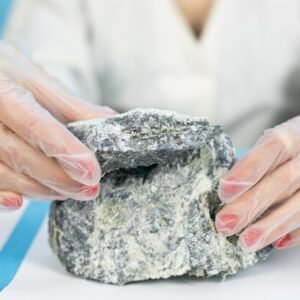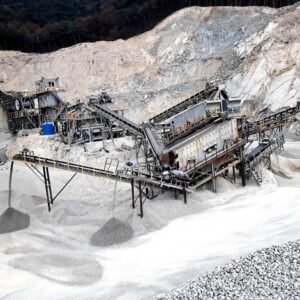Bentonite, a naturally occurring clay, plays a vital role in the oil drilling industry, particularly in the exploration and production of oil and gas. Its unique properties make it an invaluable resource for various applications within the drilling process. This article delves into the characteristics of bentonite, its uses in oil drilling, the benefits it provides, and the challenges associated with its use.
What is Bentonite?
Bentonite is a type of clay formed from the weathering of volcanic ash, primarily composed of montmorillonite, a mineral with a layered structure. This clay can absorb large amounts of water, swelling significantly in the process, which results in its characteristic gel-like texture. Bentonite is classified into two main types:
- Sodium Bentonite: Naturally high in sodium, this type is highly effective in absorbing water and forming a viscous slurry. It is typically used in oil and gas drilling operations.
- Calcium Bentonite: Contains more calcium than sodium and is less absorbent. While it has some industrial applications, it is not as commonly used in the oil drilling industry.
Applications of Bentonite in Oil Drilling
In the oil drilling industry, bentonite serves several critical functions. Its primary applications include:
1. Drilling Fluid (Mud) Composition
Bentonite is a key component of drilling mud, which is crucial for the drilling process. Drilling fluids are circulated in the borehole to provide a variety of functions, including:
- Cooling and Lubrication: As the drill bit penetrates the earth, it generates heat and friction. The drilling mud, often made with bentonite, helps to cool the bit and lubricate the drilling process, reducing wear and tear.
- Cuttings Removal: The fluid carries rock cuttings to the surface, allowing for continuous drilling without the accumulation of debris that could obstruct the drill bit.
- Pressure Control: The density of the drilling fluid helps to counterbalance the pressure of oil and gas reservoirs, preventing blowouts and maintaining well stability.
2. Wellbore Stability
Bentonite plays a critical role in maintaining wellbore stability. When drilling, the surrounding rock can collapse, leading to hazardous situations. The swelling property of bentonite helps to create a stable wall in the wellbore, preventing the surrounding rock from collapsing into the hole.
3. Sealing Properties
Bentonite’s ability to expand when wet makes it an excellent sealing agent. When used in drilling mud, it can help seal permeable formations, preventing fluid loss into the surrounding rock. This property is particularly beneficial in maintaining pressure within the borehole and ensuring that drilling fluids remain effective.
4. Environmental Protection
Bentonite is considered an environmentally friendly option in the drilling industry. Unlike some synthetic drilling fluids, bentonite is non-toxic and biodegradable, reducing the ecological impact of drilling operations. Additionally, its sealing properties can help minimize the risk of contaminating groundwater resources.
Benefits of Using Bentonite in Oil Drilling
The incorporation of bentonite in oil drilling offers several significant advantages:
1. Cost-Effectiveness
Bentonite is widely available and relatively inexpensive compared to synthetic drilling fluids. Its use can significantly reduce operational costs, making it an attractive option for oil and gas companies.
2. Versatility
Bentonite can be mixed with other materials to enhance its properties, making it suitable for various drilling environments. This versatility allows for customized drilling mud formulations tailored to specific geological conditions.
3. Improved Drilling Efficiency
The use of bentonite in drilling fluids can lead to enhanced drilling performance. Its ability to carry cuttings efficiently and maintain wellbore stability helps reduce downtime, leading to faster drilling operations.
4. Low Environmental Impact
Given its natural composition and biodegradability, bentonite is preferred by companies aiming to minimize their environmental footprint. It poses fewer risks to ecosystems compared to synthetic alternatives, aligning with increasing industry focus on sustainability.
Challenges and Considerations
While bentonite is a valuable resource in oil drilling, its use is not without challenges:
1. Quality Variability
The quality of bentonite can vary significantly depending on its source. Factors such as mineral composition, plasticity, and swelling capacity can affect the performance of drilling fluids. Companies must carefully select high-quality bentonite to ensure effective drilling operations.
2. Handling and Transportation
Bentonite can be difficult to handle due to its dusty nature, which can lead to respiratory issues for workers if not managed properly. Additionally, its transport requires specialized equipment to prevent contamination and ensure the material remains in good condition.
3. Water Sensitivity
Bentonite’s performance is highly dependent on its interaction with water. In areas with limited water availability, the use of bentonite in drilling fluids can be challenging. Moreover, excessive water can dilute the effectiveness of the bentonite, leading to potential issues during drilling.
4. Disposal Issues
The disposal of spent drilling fluids, which often contain bentonite, poses environmental challenges. Companies must adhere to regulations governing waste disposal and ensure that they manage these materials responsibly to avoid contamination.
Future Trends in Bentonite Use in Oil Drilling
As the oil and gas industry continues to evolve, so too does the application of bentonite. Several trends are emerging:
1. Enhanced Formulations
Research is underway to develop improved bentonite formulations that enhance its properties for specific drilling conditions. This includes the development of hybrid drilling fluids that combine bentonite with other materials to optimize performance.
2. Sustainability Initiatives
With increasing pressure for environmentally sustainable practices, the oil and gas industry is focusing on reducing its ecological footprint. The use of bentonite, given its natural and biodegradable properties, aligns well with these initiatives.
3. Technological Advancements
Advancements in drilling technology may lead to more efficient uses of bentonite. For instance, innovations in real-time monitoring systems can optimize the performance of drilling fluids, ensuring that bentonite is utilized effectively throughout the drilling process.
Conclusion
Bentonite is a cornerstone material in the oil drilling industry, offering a multitude of benefits that enhance drilling efficiency, wellbore stability, and environmental safety. Despite challenges such as quality variability and handling issues, its advantages make it an indispensable resource. As the industry shifts toward more sustainable practices and innovative technologies, the role of bentonite is likely to evolve, ensuring its continued relevance in the oil and gas sector.







